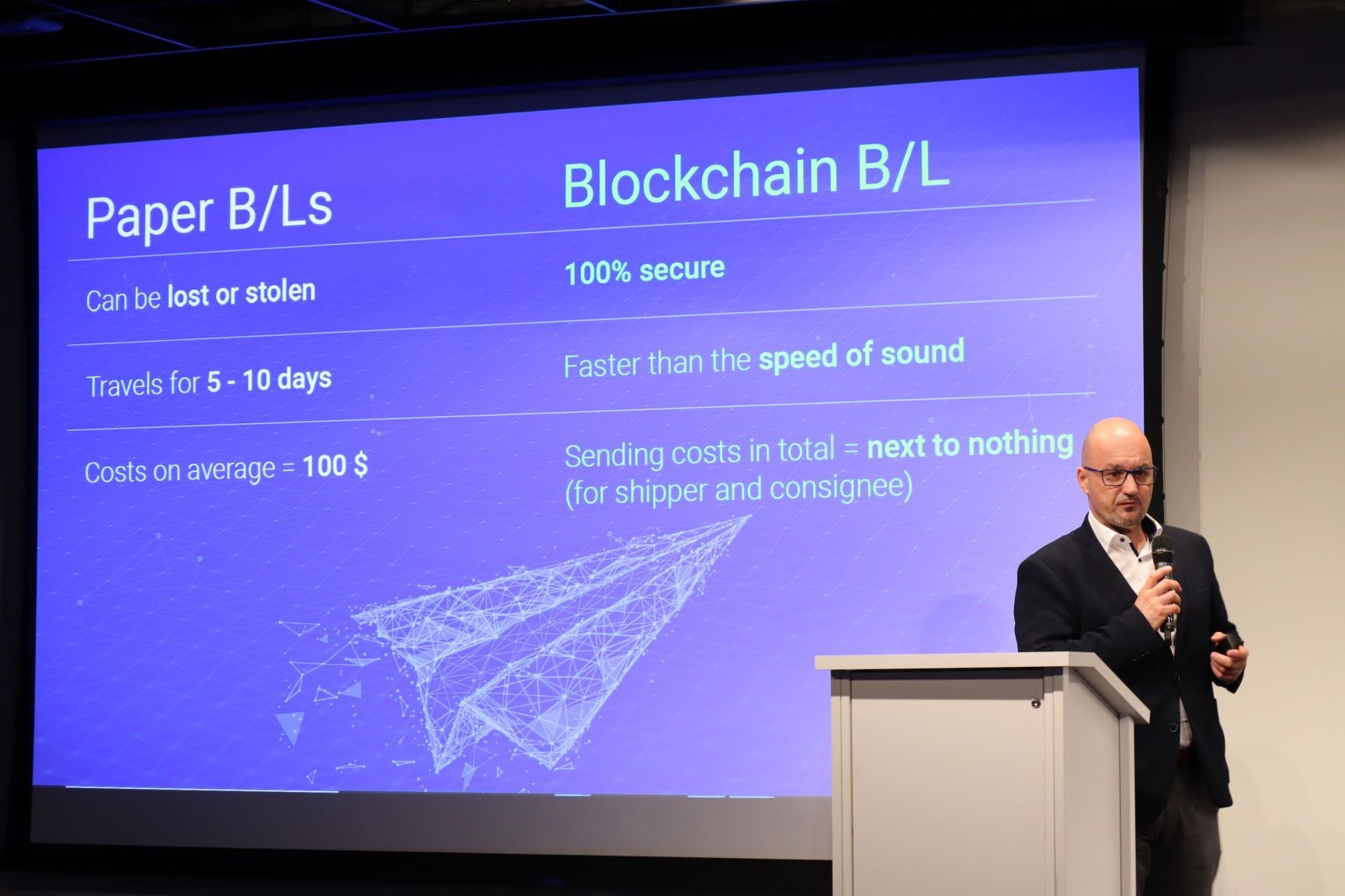4 Blockchain-Powered Logistic Tech Startups Transform the Production Definition
Before diving into these 4 companies, let’s take a look at the context of Blockchain Technology. Blockchains are incredibly popular nowadays. But how do they work, what problems do they solve and how can they be used?
Blockchain: Definition & Their Effects on Production
This technique was originally described in 1991 by a group of researchers and was originally intended to timestamp digital documents so that it’s not possible to backdate them or to tamper with them.
However, it went by mostly unused until it was adapted by Satoshi Nakamoto in 2009 to create the digital cryptocurrency Bitcoin. A blockchain is a distributed ledger that is completely open to anyone. They have an interesting property: once some data has been recorded inside a blockchain, it becomes very difficult to change it. So how does that work?
Let’s take a closer look at a block. Each block contains some data, the hash of the block and the hash of the previous block. The data that is stored inside a block depends on the type of blockchain.
A block also has a hash. You can compare a hash to a fingerprint. It identifies a block and all of its contents and it’s always unique, just as a fingerprint. Once a block is created, its hash is being calculated. Changing something inside the block will cause the hash to change.
In other words: hashes are very useful when you want to detect changes to blocks. If the fingerprint of a block changes, it no longer is the same block. The third element inside each block is the hash of the previous block. This effectively creates a chain of blocks and it’s this technique that makes a blockchain so secure.
So now you know what a blockchain is, how it works on basic level. Want to know how you can implement blockchain in production? Then checkout this article about 4 companies using Blockchain Technology in their Business here.
#1. ShipChain: The huge Blockchain Solution
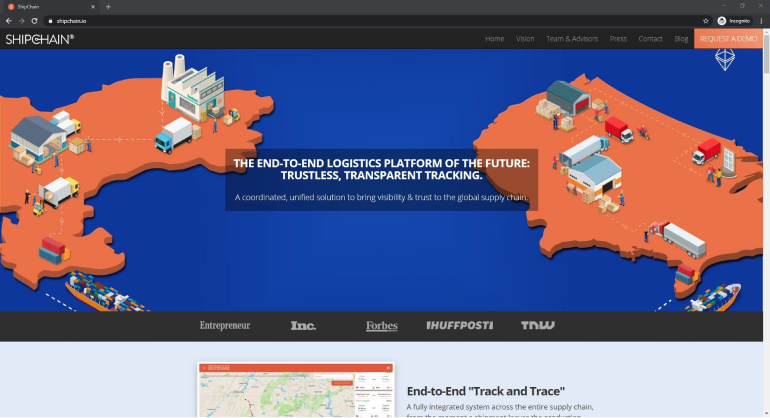
ShipChain was selected by the World Economic Forum (WEF) as one of the roughly 100 supply chain companies and experts that will help build and come up with the parameters for the Blockchain Toolkit. Blockchain is now becoming the obvious choice for bringing efficiency and transparency to the supply chain and ShipChain is constantly looking to improve its offerings by delving deep into the myriad offerings of this potent technology.
What is ShipChain?
ShipChain is a logistics utility ecosystem using blockchain technology to combat fraud and reduce losses in the shipping industry. ShipChain’s cutting-edge visibility platform is here to make your supply chain more effectively secure and transparent it shows you where your goods are and sends notifications to alert you of geographic location changes.
Shipchain shipped billions of dollars in the product over the years. This company provides a complete integration system for logistics companies to leverage the benefits that blockchain has to offer, including trustless contract execution, historical data immutability, and no single point of failure.
ShipChain Technology
This company has added security because their solution is utilizing blockchain technology to document and verify each step in the supply chain. ShipChain is revolutionizing document handling – by providing a place to view data and information in a raw and untarnished format. This data is literally stamped and stored, kind of like with a public notary service and can never be changed or tampered with.
ShipChain provides a means to trust and transparency to an otherwise opaque and difficult to trust ecosystem.
Additionally, their platform connects with virtually all IoT device’s electronic logging devices trackers and FC devices and more. ShipChain’s Business Intelligence Platform helps by giving customers a visual overview of the status of the supply chain as well as for analytics to improve efficiency and reduce costs. Their customer can also quickly identify if weekly or daily goals are being met and if problems do come up during transit.
ShipChain is completely intermodal and capable of tracking virtually any form of transport: trains, planes, trucks, etc.
The ecosystem is composed of several services that are designed to work together, but can function independently.
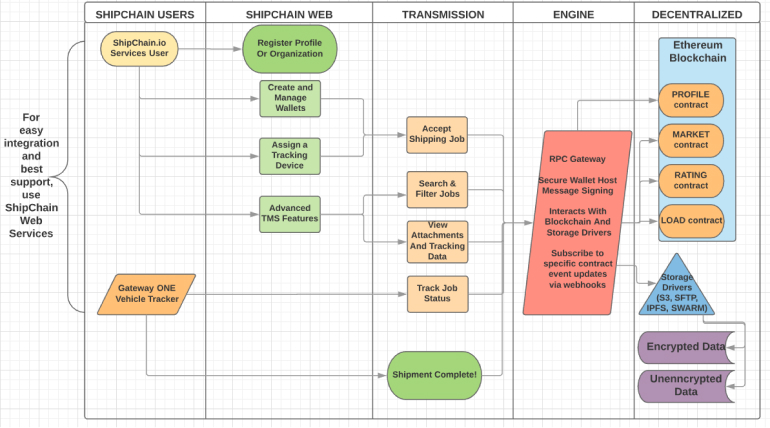
The ShipChain Mission
“We are doing this to transform the way that monkeys ship bananas in the future.” – John Monarch is the CEO of ShipChain (SHIP) cryptocurrency project.
Transactions on the blockchain for freight shipments will be paid using ShipChain ERC20 SHIP Token, and settled in tokens. The ShipChain Web platform will allow users to pay either directly in tokens they hold, or purchase tokens from ShipChain for booking freight. Their mission is not only to change the shipping industry but potentially change the world with what ShipChain is doing.
#2. BlockApps
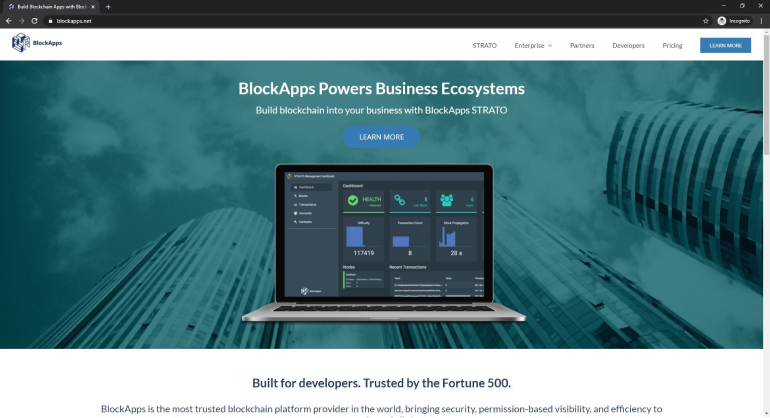
What is BlockApps?
BlockApps is the leading provider and innovator of technology for programmable business networks through our platform – BlockApps STRATO. BlockApps was the first company incubated out of Consensys in 2015 and launched the Blockchain as a Service category with Microsoft. We have also founded the Enterprise Ethereum Alliance, and are the first Blockchain Platform to partner with Azure, AWS, GCP and Red Hat.
BlockApps continues to lead blockchain technology implementation for enterprise & startups alike.
BlockApps has created an implementation of the Enterprise Ethereum protocol, along with tooling and APIs to interact with this implementation. Together, these components form the STRATO platform.
Component Stack
Pluggable VM: STRATO contains a pluggable VM which allows users to select between the Ethereum VM (default) and Solid VM. The Ethereum VM that executes smart contracts based on the Ethereum virtual machine as described in the Ethereum Yellow Paper. These smart contracts are written in the Solidity programming language. Solidity smart contracts are then compiled to byte code that can be executed by the EVM using a Solidity compiler. The SolidVM is a Solidity-based VM that can execute Solidity-based smart contracts without compiling them to byte code.
- P2P: This component interacts with other STRATO nodes, communicating block and transaction information with other participants
- Kafka: Internal messaging bus used by various components of the STRATO platform
- STRATO Management Dashboard: A UI to visually interact with and manage the STRATO node.
- Central Monitoring Dashboard: A UI to visually monitor and manage nodes on the STRATO network.
- REST APIs: Various APIs enable developers to interact with STRATO platform, allowing them to perform a variety of tasks such as: Submit Transactions, User Key Management, Compile Smart Contracts, etc.
How does BlockApps use its Blockchain Technology in their Business?
STRATO is a flexible blockchain solution for building and running business networks. STRATO serves as the base layer for secure business network transactions and activity, creating a highly extensible platform for business groups to use.
STRATO can be deployed on any major cloud provider and can be configured for many types business activities. STRATO is built integrate with other systems while providing clear control over data access and privacy
- Flexible & Secure Access: Each STRATO instance connects to the external world through a secure authentication layer that ensures security and convenience for its users. Both external (e.g. SAP) and internally-developed applications can use standard API requests to get and send information to the blockchain network.
- Fast & Accurate Data: STRATO efficiently stores data on the blockchain, keeping transaction data readily available to those who need access while ensuring private network information is secure.
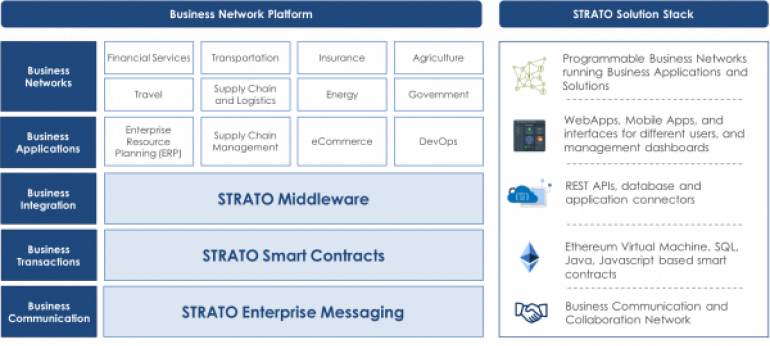
BlockApps Mission
Their mission is to restore to digital transactions the reliability and efficiency of face-to-face interactions through secure and connected information.
Our dedicated team strives towards this goal by developing our blockchain-powered business network platform and partnering with technology and industry organizations aligned with our vision. BlockApps was the first company incubated out of Consensys in 2015 and has created several industry innovations including the launch the best, easy-to-use, most powerful Blockchain as a Service platform on the market called STRATO.
Since launching STRATO on Microsoft Azure in 2015, BlockApps was also the first blockchain company to partner with all major cloud platforms (Azure, Amazon Web Services, Google Cloud Platform) and is a founding member of the Enterprise Ethereum Alliance (the world’s largest open standard blockchain organization).
#3. Fr8 Networks
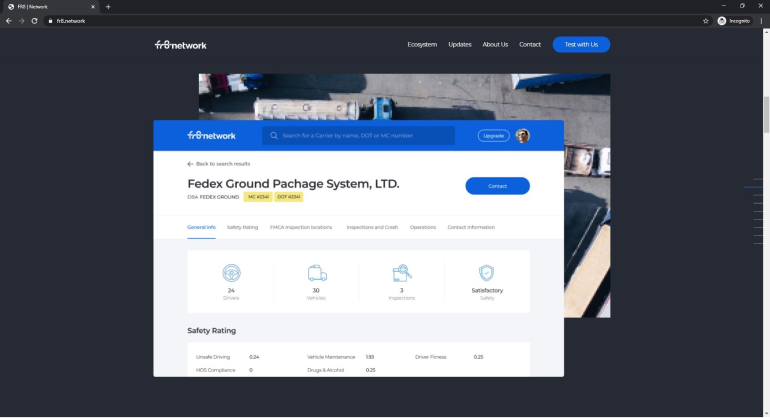
Fr8 Network is positioned to change how goods are moved through information systems. The Fr8 Network is a set of applications, services, and protocol specifications backed by blockchain technology, built to bring visibility, automation, and trust into the logistics ecosystem. Access to these tools will be modular and pricing schemes diverse.
The Fr8 Marketplace is the first platform built on top of Fr8 Network’s second product, the Fr8 Protocol. This protocol will be accessible through a suite of powerful and scalable APIs. It is designed to service the logistics life cycle of a product moving through a supply chain and includes APIs to record and read data about location, temperature, relevant documents, payment status, and more. Access to the protocol will be billed by transaction volume and total storage and is competitive with that of standard cloud-based platforms.
Where do Fr8 use Blockchain Technology?
Blockchain is used throughout the protocol to prove the existence, authenticity, and integrity of all shipment data. While documents, metadata, transit data, and such are stored off-chain, an immutable fingerprint of the data in the form of a SHA-256 hash is stored on-chain. The blockchain inherently keeps an immutable changelog and access log of the shipments. This methodology keeps sensitive business data private. Certain objects in the Transport Document Core have a hybrid existence and utilize both on- and off-chain storage. Identity, permissions, and authentication are handled on-chain.
#4. Spot Supply Chain Systems
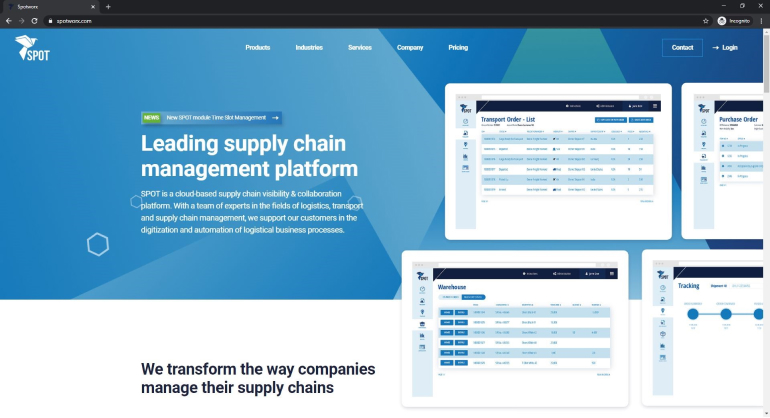
So many things stand out about Spot Supply Chain System. So we’ll start by the simple usage of SPOT. This company provides a cloud-based supply chain management software to create more value throughout its global supply.
How does it work?
The system-driven workflows of SPOT help reducing costs, enhancing flexibility and lowering risk. By creating a digital model of the goods and information involved we enable visibility and better collaboration between all partners in the logistical process
From procurement to production, transport, warehouse management and distribution, SPOT brings all involved parties together on one platform for efficient communication and optimized processes.
SPOT provides transparency along the entire supply chain and simplifies communication to promote fast and solution-oriented decisions. System-driven workflows and discrepancy notifications ensure process quality, delivery reliability and cost-efficiency. SPOT can easily be connected to your systems and is accessible from any desktop or mobile device.
The Bottom Lines
Understanding the future of Blockchain Technology in the production and supply chain is essential to success for every company.
The creation of blockchain technology peaked a lot of people’s interest. Soon, others realized that technology could be used for other things like storing, medical records, creating a digital notary or even collecting taxes. Even service agencies could leverage blockchain in the supply chain to track trunk stock, empowering technicians and company agents regardless of their level in the organization.
Ultimately, the blockchain system clearly has a great application in the design of operating and control systems in all industries. Then, all industries will apply blockchain extensively, companies or products that do not meet this technology will be left behind!
You Might Also Like:
Top 11 Essential and Effective Features of Supply Chain Software

